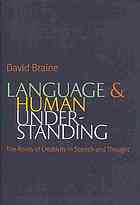Product desciption
Language And Human Understanding The Roots Of Creativity In Speech And Thought David Braine by David Braine 9780813221755, 0813221757 instant download after payment.
Human speech and writing reveal our powers both to generalize and to criticize our own procedures. For this we must use words non-mechanically and with a freedom without definite limits, but still allowing mutual intelligibility. Such powers cannot be simulated by any possible physical mechanism, and this shows that human beings in our acts of judgment and understanding transcend the body. Philosopher, psychologist and linguist are all concerned with natural language. Accordingly, in seeking a unified view, Braine draws on insights from all these fields, sifting through the discordant schools of linguists. He concludes that one extended logic or "integrated semantic syntax" shapes grammar, but without constricting languages to being of one grammatical type. Language as learnt and speech are both essentially public, geared to a community of language-users. Therefore, psycholinguists should imitate Gibson's treatment of our perceptual system and treat learning and use of language as arising by adaptation to our social and natural environment. Through taking the malleability of the functioning of the brain and its parts to an extreme, grammar has become unrestricted by neurology, limited only by logical and pragmatic constraints. For Braine, a language is a living thing, both in the development of thought and in conversation. Chomsky has entrenched a static, building-block, model of a language as a code, each lexical item with just one meaning. Yet in our learning and use of language each word develops an indefinite spread of uses or senses adapted to the realities and questions which we have to confront. The idea "one lexical item, one meaning" applies only to formal languages, not to the natural language which extends beyond social life to embrace mathematics, physics and all the sciences, religion and literature. In rewriting the philosophy of grammar, Braine restores the dynamic conception of language, reuniting structure and communicative function. Grammar, typically through the verb, gives the sentence its "saying" function, the verb being what brings the sentence to life, giving the sentence's other elements their role and force.


